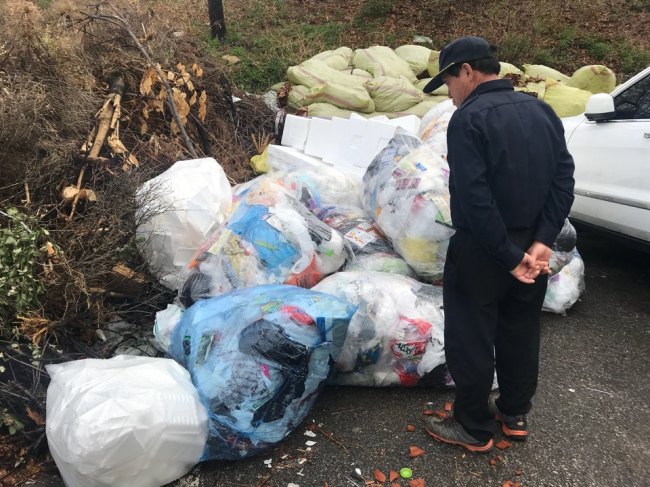[Newsmaker] Confusion, anger continue over restrictions on recyclables
Garbage collection companies reject plastic, in opposition to Seoul and Environment Ministry
By Bak Se-hwanPublished : April 4, 2018 - 16:05
Recent Chinese restrictions on the types of recyclables that it will purchase continue to cause much confusion, as both residents and management offices of apartment complexes struggle to understand what can and cannot go in their recycle bins.

Officials at SsangYong Apartment in Gangnam said they spent much of the week receiving phone calls from confused and frustrated residents who see uncollected garbage piling up on the curbside.
“The recyclables collection company notified us they are no longer collecting plastics and some other recyclables starting this month due to low profit. Either the local government or the city should step up and take these materials. We cannot keep piling them up like this,” Ahn Jong-min, head of the apartment management office, told The Korea Herald.
The recyclables collection problem stems from China, the biggest importer of recyclables in the world, which announced in July that it would stop importing 24 kinds of solid waste by the end of the year. The items banned include polyethylene terephthalate bottles, other plastic bottles and containers and all mixed paper.
Following the ban, 48 for-profit recyclables collection companies operating in Seoul, Incheon and Gyeonggi Province notified individual apartment complexes with whom they have contracts that they would stop collecting the items due to low profitability.
On April 2, the Ministry of Environment said in a statement that the companies had agreed to resume collecting recyclables on China’s banned list through consultations with the ministry.
However, at least one of the collection companies, RC Corporation, maintains it was not consulted.
In a phone interview, RC Corporation Chief Management Officer Hong Do-Chan said there were “no such consultations with the ministry or Seoul City,” adding that the company would continue to keep plastics off their collection list.
“It’s shocking how little understanding the government and the city officials have of the recyclables collection system here,” Hong said. “They probably consulted with companies that process and sort the collected recyclables, but they should’ve talked to us about who collects them in the first place.”
While it seems counterproductive for the collectors to limit the kinds of recyclables, Hong explained the business.
“Prices of mixed paper or plastics have dropped significantly due to China, which have, in turn, reduced the profitability of recycling here. Simply put, we can’t make profit. Other private recyclables collection companies have the same situation, and we have demanded local governments since two years ago to take care of those materials, while we collect the rest,” Hong said.
The ongoing recyclables collection controversy has confused and angered residents at large apartment complexes who say the overflowing waste clearly indicates the government‘s lack of preparedness for China’s ban.
“We clearly had a whole six months to think about how to deal with those materials, or reduce them in the long term. Is there really no way to clear it?” said Kim Hye-sook, 52, a resident at SsangYong apartment complex.
Another resident said she was “shocked” by the crumbling recyclables collection system.
“I think our country has some of the strictest waste disposal rules, requiring us to separate food waste, general waste and recyclables. They fine people for not complying with the rules, and now the rules are obviously not working properly,” Park Soo-hyun, 40, said.
To address concerns, the Environment Ministry said Monday it would investigate plastic waste collection in residential areas if recyclers refused to collect. It is, however, not illegal for them, as they are private companies that signed contracts with individual apartment complexes.
Additionally, the ministry said it would promote the proper sorting and recycling of waste to keep costs down for recycling companies, while setting up measures to reduce excessive waste.
By Bak Se-hwan (sh@heraldcorp.com)



![[Exclusive] Korean military set to ban iPhones over 'security' concerns](http://res.heraldm.com/phpwas/restmb_idxmake.php?idx=644&simg=/content/image/2024/04/23/20240423050599_0.jpg&u=20240423183955)
![[AtoZ into Korean mind] Humor in Korea: Navigating the line between what's funny and not](http://res.heraldm.com/phpwas/restmb_idxmake.php?idx=644&simg=/content/image/2024/04/22/20240422050642_0.jpg&u=)



![[Graphic News] 77% of young Koreans still financially dependent](http://res.heraldm.com/phpwas/restmb_idxmake.php?idx=644&simg=/content/image/2024/04/22/20240422050762_0.gif&u=)
![[Herald Interview] Why Toss invited hackers to penetrate its system](http://res.heraldm.com/phpwas/restmb_idxmake.php?idx=644&simg=/content/image/2024/04/22/20240422050569_0.jpg&u=20240422150649)





![[Exclusive] Korean military to ban iPhones over security issues](http://res.heraldm.com/phpwas/restmb_idxmake.php?idx=652&simg=/content/image/2024/04/23/20240423050599_0.jpg&u=20240423183955)



![[Today’s K-pop] Ateez confirms US tour details](http://res.heraldm.com/phpwas/restmb_idxmake.php?idx=642&simg=/content/image/2024/04/23/20240423050700_0.jpg&u=)